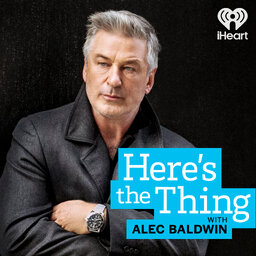Thom Yorke
Thom Yorke, Radiohead and Atoms for Peace frontman, admits that, even after over 25 years in the business, performing is “either wicked fun or really awful.” He talks with Alec about his pre-show ritual—"I stand on my head for a bit"—and how he and his bandmates have been able to stick together since they were teenagers.
Learn more about your ad-choices at https://www.iheartpodcastnetwork.com
In 1 playlist(s)
Here's The Thing with Alec Baldwin
Award-winning actor Alec Baldwin takes listeners into the lives of artists, policy makers and perfor…Social links
Follow podcast
Recent clips

Here's The Thing: Trailer
01:41

E Jean Carroll on Writing and Resilience
35:20

Kat Owens Raises Environmental Awareness Through Art
40:08
 Here's The Thing with Alec Baldwin
Here's The Thing with Alec Baldwin